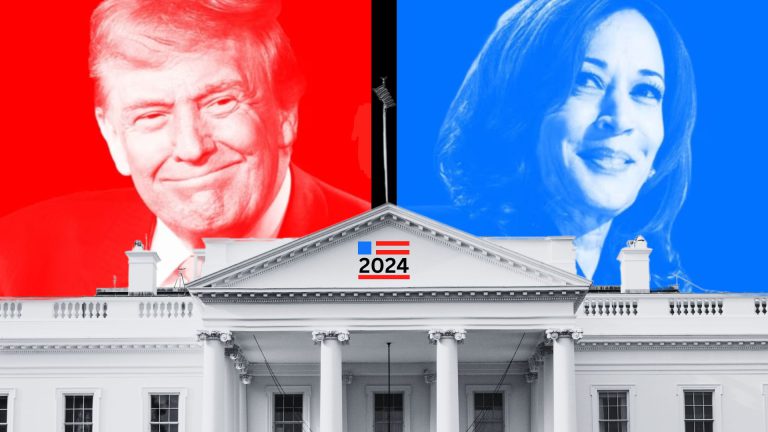In the final weeks of the 2024 election campaign, the contest between Donald Trump and Kamala Harris is not only dominating political headlines but also influencing financial markets.
Historically, U.S. presidential elections have been closely tied to stock market performance, as investor sentiment and market behaviour shift in response to policy uncertainty, potential regulatory changes, and broader economic conditions. In this context, it is important to understand how election years typically affect the stock market, as well as how investors can position themselves in the lead-up to Election Day.
Both Donald Trump and Kamala Harris represent different economic priorities, and investors are watching closely to see how each candidate’s platform might impact key sectors of the economy.
The market tends to dislike uncertainty, and elections often cause market swings as investors weigh the potential outcomes. However, despite the volatility, stock markets in election years have shown a historically positive correlation with strong returns, suggesting that while elections create uncertainty, they don’t necessarily harm long-term market performance.
Historically, U.S. election years have produced positive stock market returns more often than not. The following analysis of stock market performance, specifically through the S&P 500 Index, demonstrates how the market has responded during past elections:
Presidential Election Cycle Theory
The Presidential Election Cycle Theory suggests that markets tend to perform best during the third and fourth years of a president’s term, with the final year (election year) often reflecting market optimism. This is because incumbent presidents usually introduce economic policies or stimulus measures that aim to boost growth and consumer confidence in the lead-up to the election. Regardless of whether the incumbent is re-elected, the market historically trends upward in election years.
Historical Stock Market Returns in Election Years
1928: The S&P 500 gained 43.6% during a year that saw Republican Herbert Hoover’s victory, followed by the 1929 market crash and the Great Depression.
1980: The market surged 25.7% during Ronald Reagan’s election, reflecting optimism about his pro-business, lower-tax agenda.
1992: Bill Clinton’s election saw a modest 4.5% gain, with markets cautiously responding to his middle-of-the-road economic approach.
2016: Donald Trump’s surprise win led to a 9.5% market increase, driven by expectations of tax cuts, deregulation, and pro-business policies.
Over the last century, the S&P 500 has delivered positive returns in 19 of the last 23 U.S. presidential election years, with an average gain of around 7.1%. This pattern suggests that despite the volatility and uncertainty elections create, the market generally fares well in election years.
Key Considerations
As we approach the 2024 election, markets are paying close attention to several factors that will likely shape the outcome and impact investor behaviour:
Policy Uncertainty and Volatility
Investors should be prepared for short-term market swings as the political landscape evolves and polls fluctuate. A Trump presidency could reignite the policies of deregulation, tax cuts, and trade protectionism that defined his first term. This would likely benefit sectors such as energy, defence, and industrial, but could create new risks in areas like global trade.
Meanwhile, a Harris presidency would likely emphasise climate change, healthcare reform, and social equity, potentially providing tailwinds for renewable energy, infrastructure, and tech sectors, while creating headwinds for industries facing increased regulation, such as traditional energy and pharmaceuticals.
Broader Economic Environment
While elections have a direct impact on investor sentiment, it’s important to recognize that broader economic factors will likely play a more significant role in determining long-term stock market performance. Investors should focus on key economic indicators such as GDP growth, Federal Reserve policies, unemployment, and global trade conditions, rather than simply reacting to election-related headlines.
As of 2024, the U.S. is navigating a complex economic environment characterized by higher interest rates, inflationary pressures, and ongoing disruptions to global supply chains. These factors will weigh heavily on market performance, regardless of who wins the election.
Sector-Specific Opportunities
Different sectors of the stock market will respond differently depending on the winner of the election. Investors should consider the policy impact on key industries when positioning their portfolios:
– If Trump is re-elected, sectors like energy, financial services, and defence may benefit from a continuation of pro-business, pro-energy, and deregulation policies.
– If Harris wins, sectors like clean energy, healthcare, and technology may benefit from policies that focus on sustainability, healthcare reform, and innovation.
How Investors Can Position Themselves During Election Cycles
Navigating the stock market during election cycles requires a clear strategy. Here are some key ways investors can position themselves:
Diversification
Election years often bring volatility, so maintaining a diversified portfolio is crucial. By spreading investments across different sectors and asset classes, including both domestic and international equities, bonds, and commodities, investors can mitigate risk and capture growth opportunities, regardless of the election outcome.
Focus on Long-Term Fundamentals
While elections can create short-term fluctuations, long-term investors should remain focused on the fundamentals. Companies with strong balance sheets, consistent earnings growth, and solid competitive advantages are likely to perform well over time. History has shown that timing the market based on political outcomes can lead to costly mistakes.
Avoid Emotional Decisions
Emotional reactions to political developments often lead to impulsive, short-sighted investment decisions. Instead, investors should assess their long-term financial goals, risk tolerance, and investment horizon. While it’s tempting to react to short-term political news, remaining patient and sticking to a disciplined investment strategy is often the best course of action.
Consider Defensive Sectors
During periods of uncertainty, defensive sectors like utilities, consumer staples, and healthcare can provide stability. These sectors tend to perform well regardless of economic or political changes, making them a safer option for more risk-averse investors.
Regardless of the election outcome, investors should focus on broader economic indicators such as GDP growth, unemployment, and Federal Reserve policies while avoiding emotional decision-making driven by political headlines. By positioning themselves strategically—through diversification, focusing on fundamentals, and remaining patient—investors can successfully navigate the complexities of election cycles and the financial markets.
Where does your financial adviser come into all of this?
At Osborne Financial, personal investments are a key part of our financial planning. It is important when thinking about making such investments, that you are thinking about how they feed into your financial goals.
We take a fully holistic and thorough approach concerning personal investments, taking a look at your personal and financial circumstances and putting together a plan of action.
Please do not hesitate to contact a member of the team if you would like to find out more about investments.
The information provided on the pages, blogs, and articles contained within this website are solely for information purposes only and do not constitute financial advice. Professional advice should always be sought from a financial adviser.



